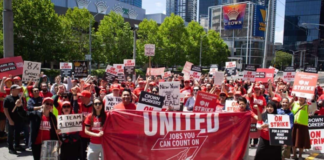Household share of income nears 50-year low
Profits surged 40 per cent in the year to March, while wages barely grew at all. Wage growth was just 0.9 per cent in the last year, including the impact of fewer hours worked. This is well below the rise in the cost of living of 2.1 per cent.
The wages share of Australia’s GDP is approaching a 50 year low at 51.5 per cent, down from 54.2 per cent towards the end of last year.
New analysis by Paul Dales from Capital Economics has shown a 40-year downward trend. Dales said in a note to clients that households have not seen “one cent” of the extra wealth created by the mining boom because, “it’s all gone into the pocket of business”. He also pointed out that the, “share of GDP, the compensation of Australian employees lies towards the bottom of the international ladder.” By contrast, “Back in 1975, Australian households received a bigger share of the economic pie than households in the US, France and New Zealand. Only in the UK did the compensation of employees account for a larger share of GDP.”
‘Wealth boom’ for richest 200
The Financial Review’s annual “Rich List” has declared a “wealth boom”. The combined wealth of Australia’s 200 richest people reached record levels in 2017 at $233 billion. The top ten richest Australians were worth $75 billion alone.
The list broke further records with the number of billionaires on it reaching an all-time high of 60. A record number of people have amassed more than $10 billion in wealth: manufacturing tycoon Anthony Pratt topped the list with $12.6 billion, followed by property developer Harry Triguboff on $11.4 billion and mining magnate Gina Rinehart with $10.4 billion.
Google says gender equity check too expensive
Tech-giant Google has argued that a government audit of its pay practices is “too expensive” to comply with. Google is currently battling the US Department of Labor (DoL) in court, accused of gross pay discrimination against female employees. Surveys have revealed a widespread problem of women earning less than men in the same roles in the tech industry in the US.
Google argued in Federal Court in May that it would take 500 hours of work and $100,000 to comply with the government request for pay data across the company. Kristin Zmrhal, Google’s senior legal operations manager, testified that retrieving the gender pay data “became too burdensome”. DoL lawyer Ian Eliasoph mocked the company’s defence saying, “Google would be able to absorb the cost as easy as a dry kitchen sponge could absorb a single drop of water.”
With a $28 billion annual income Google is one of the most profitable companies in the US. In 2015 Google announced with great fanfare that it would be spending $150 million on “diversity initiatives”.
Chevron fights for right to pay no tax
In what could be the largest single matter before the Australia Tax Office, US energy giant Chevron is contesting an attempt to claw back over $1 billion in unpaid tax. Chevron paid no corporate tax in five of the last seven years but is fighting tooth and nail to avoid paying $1.062 billion in back taxes.
According to Fairfax the unpaid tax dollars could pay for a new 400 bed hospital or 17 new high schools. Chevron evades tax by charging excessive interest to its Australian subsidiary on a $42 billion loan. Although the inflated interest is simply transferring money from one part of the company to another, on paper it reduces Chevron’s profit in Australia. The scheme is known as “transfer pricing” and is a clever way for multinational companies to “export” profits.
The current dispute with the ATO comes off the back of a transfer pricing case Chevron lost in April. Although promising to contest the decision in the High Court, they were forced to repay $340 million in taxes, penalties and interest. In that case Chevron’s Australian arm paid its US arm $1.84 billion in interest on a loan that cost Chevron in the US just $110 million to service.
Murdoch throws tantrum over Corbyn result
Rupert Murdoch reportedly “stormed out” of The Times election night party in London following the release of exit polls showing a surge in support for Corbyn. Murdoch’s papers campaigned viciously against Corbyn, with The Sun urging readers to, “rescue Britain from the catastrophe of a takeover by Labour’s hard-left extremists” and running front page headlines including “Jezza’s jihadi comrades” and “Don’t chuck Britain in the Cor-bin”. In the past The Sun has boasted of swinging elections, leading both major parties to court Murdoch’s favour.
The UK Labour leader and socialist increased his party’s vote share more than any Labor leader since 1945, despite hostility of the bulk of the media and most MPs in his own party.
Asset manager shuts shop in fear of market meltdown
Australian asset manager Altair has made a dramatic decision to hand back hundreds of millions of dollars to investors and liquidate its Australian funds. Phillip Parker, who serves as the fund’s Chairperson, released a statement in May outlining the plan to return money in order to protect clients’ interests.
He told Fairfax, “We think that there is too much risk in this market at the moment, we think it’s crazy”. The threats cited by Parker included Australia’s east coast property prices, predictions that China’s overheated property sector would implode “later this year”, an “unpredictable” political situation in the US and an “overvalued” Australian equity market. “Australia hasn’t had its GFC event, we’ve been living in this fool’s paradise. But if China slows down the way the guys think it will towards the end of this year, then that’s 70 per cent of our exports [affected].” he said.





